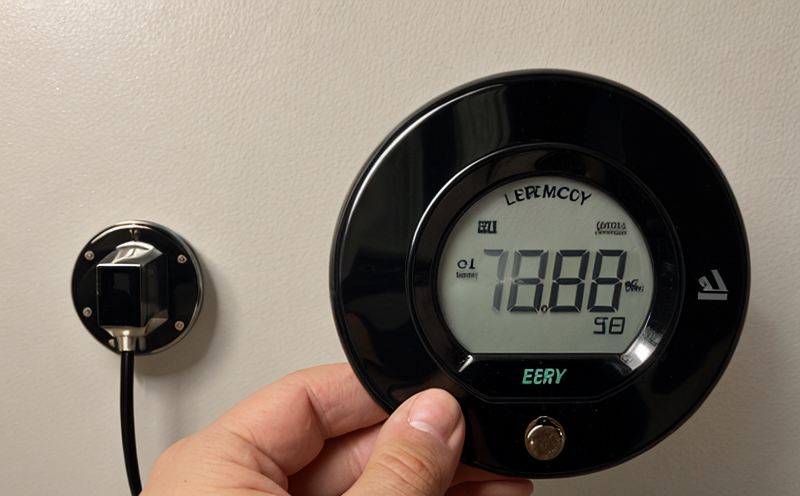DIN V 4701 Energy Consumption Testing for Heating Systems
The DIN V 4701 standard is a crucial framework for testing and certifying energy consumption in heating systems. This standard ensures that the devices meet specific energy efficiency requirements, thereby contributing to sustainable development goals. Compliance with this standard is not only essential for manufacturers aiming to meet regulatory demands but also beneficial for end-users who seek reliable and efficient heating solutions.
The process involves rigorous testing of various parameters such as input power, output power, and the efficiency ratio under different operating conditions. This ensures that the heating system operates optimally while consuming minimal energy. The test setup typically includes calibrated equipment to measure these parameters accurately. Compliance with DIN V 4701 is often a prerequisite for marketing products in European markets.
The standard's scope covers residential and commercial heating systems, including boilers, heat pumps, and radiators. It specifies detailed procedures for measuring energy consumption under controlled laboratory conditions. This ensures that the test results are consistent across different manufacturers and testing facilities.
Compliance with DIN V 4701 is beneficial not only for manufacturers but also for end-users who seek reliable heating solutions. By adhering to this standard, manufacturers can ensure their products meet stringent efficiency criteria, which translates into lower operating costs for consumers. Additionally, it fosters innovation and promotes the development of more efficient heating systems.
The testing process involves several key steps:
- Preparation of the specimen: This includes ensuring the heating system is in a known state before testing begins.
- Calibration of test equipment: Ensuring all instruments are accurate to provide reliable results.
- Data collection: Recording energy consumption during various operating conditions.
- Analysis and reporting: Interpreting data collected from tests and preparing detailed reports.
The acceptance criteria for DIN V 4701 are based on the efficiency ratio, which is calculated as the output power divided by the input power. The standard specifies minimum acceptable values for this ratio under different operating conditions. Compliance with these criteria ensures that the heating system operates efficiently and meets market expectations.
| Application | Description |
|---|---|
| Residential Heating Systems | Involves testing boilers, radiators, and other heating devices used in residential settings to ensure energy efficiency. |
| Commercial Heating Systems | Covers heat pumps and large-scale boilers used in commercial buildings to optimize energy consumption. |
| Retrofit Installations | Ensures existing systems are upgraded to meet current DIN V 4701 standards, improving overall efficiency. |
| New Product Development | Guides manufacturers during the design and development phase to ensure products comply with energy efficiency standards. |
The testing process is critical for ensuring that heating systems operate efficiently and meet stringent regulatory requirements. By adhering to DIN V 4701, manufacturers can gain a competitive edge by offering products that are not only environmentally friendly but also cost-effective for end-users.
Why Choose This Test
- Ensures compliance with international standards for energy efficiency.
- Provides reliable and consistent test results across different facilities.
- Increases marketability of products by meeting regulatory requirements.
- Promotes innovation in the development of efficient heating systems.
- Reduces operating costs for consumers through optimized energy consumption.
- Fosters sustainable development by encouraging the use of environmentally friendly technologies.
Environmental and Sustainability Contributions
The DIN V 4701 testing process plays a significant role in promoting environmental sustainability. By ensuring that heating systems operate efficiently, this standard helps reduce greenhouse gas emissions associated with energy consumption. This contributes to the global effort towards combating climate change.
In addition to reducing carbon footprints, compliance with DIN V 4701 also supports other environmental goals such as resource conservation and waste reduction. Efficient heating systems help minimize the need for additional energy production, thereby conserving natural resources.
The standard's focus on sustainability extends beyond just energy consumption; it also encourages the use of renewable energy sources in heating systems. This aligns with broader efforts to transition towards more sustainable energy practices.
By promoting efficient and environmentally friendly heating solutions, DIN V 4701 contributes to a healthier planet for future generations. It is an essential tool for manufacturers, quality managers, and compliance officers looking to make a positive impact on the environment while maintaining high standards of product performance.





